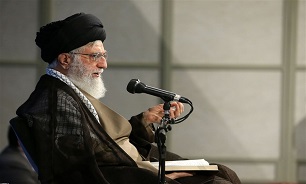Ayatollah Khamenei Urges Muslim Action against Myanmar Gov’t
 Addressing a religious course in Tehran on Tuesday,
Ayatollah Khamenei deplored the catastrophic violence against Muslim people in
Myanmar, and strongly criticized the muted response and inaction by the
international organizations and the self-proclaimed advocates of human rights
to the plight of Myanmar Muslims.
Addressing a religious course in Tehran on Tuesday,
Ayatollah Khamenei deplored the catastrophic violence against Muslim people in
Myanmar, and strongly criticized the muted response and inaction by the
international organizations and the self-proclaimed advocates of human rights
to the plight of Myanmar Muslims.
Stressing the need for "practical” measures and intervention by the Islamic countries, the Leader explained that such practical action would not entail a military campaign, but the Muslim countries "should mount political, economic, and trade pressure on the Myanmarese government and cry out against such crimes in the international circles.”
The catastrophe in Myanmar should not be downgraded to a sectarian conflict between Muslims and Buddhists, Imam Khamenei underscored, describing the crisis as a political issue that might have been affected by some degree of "religious bigotry.”
"This case (in Myanmar) is a political one, because it is being executed by the government of Myanmar, which is led by a merciless woman that has won the Nobel Peace Prize,” Ayatollah Khamenei added, noting that such terrible events in Myanmar have indeed "marked the demise of the Nobel Peace Prize.”
The cruel government of Myanmar is committing crimes against Muslims before the eyes of the Islamic countries, the international organizations, and the hypocritical governments which falsely claim to be advocating human rights, Imam Khamenei deplored.
The Leader also criticized the UN secretary-general for only a verbal condemnation of the crimes against Muslims in Myanmar, saying the advocates of human rights that sometimes "raise hue and cry for the punishment of a criminal in a country” have surprisingly remained silent about the killing and displacement of tens of thousands of people in Myanmar.
Ayatollah Khamenei finally stressed that the Organization of Islamic Cooperation should convene a conference on the catastrophe in Myanmar.
"Today’s world is the world of tyranny,” Imam Khamenei noted, saying the Islamic Republic will remain honor-bound to rise against tyranny and express its stances "explicitly and courageously” against oppression anywhere in world, either in the occupied Palestinian territories, in Yemen, in Bahrain, or in Myanmar.
The Rohingya Muslims in Myanmar have long faced severe discrimination and were the targets of violence in 2012 that killed hundreds and drove about 140,000 people from their homes to camps for the internally displaced.
Nearly 150,000 Muslims have fled Myanmar for Bangladesh over the past weeks.
In a rare letter to the UN Security Council last week, Secretary-General Antonio Guterres expressed concern that the violence in Rakhine could spiral into a "humanitarian catastrophe”.
The Burma Human Rights Network (BHRN) has said the persecution is backed by the government, elements among the country's Buddhist monks and ultra-nationalist civilian groups.
